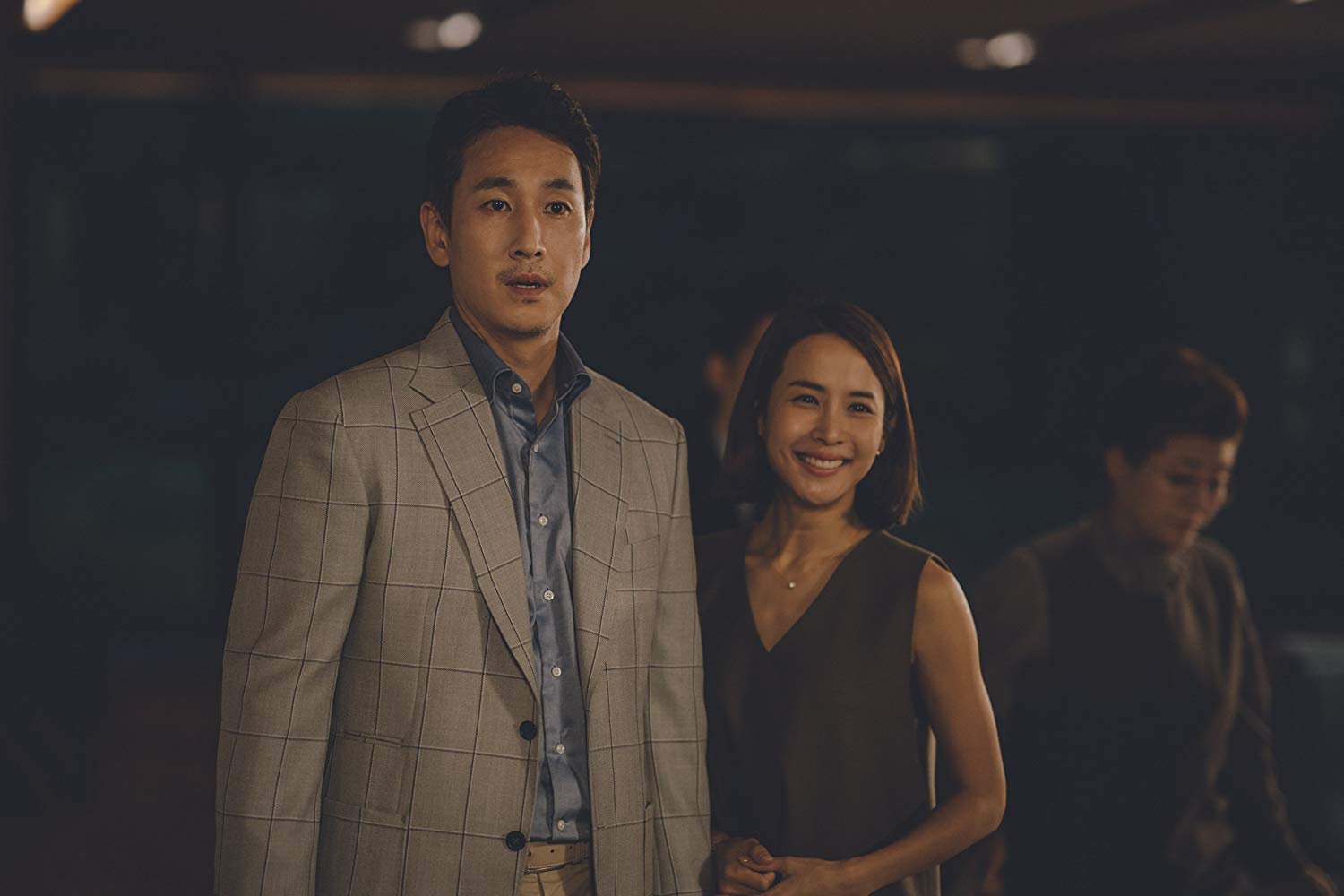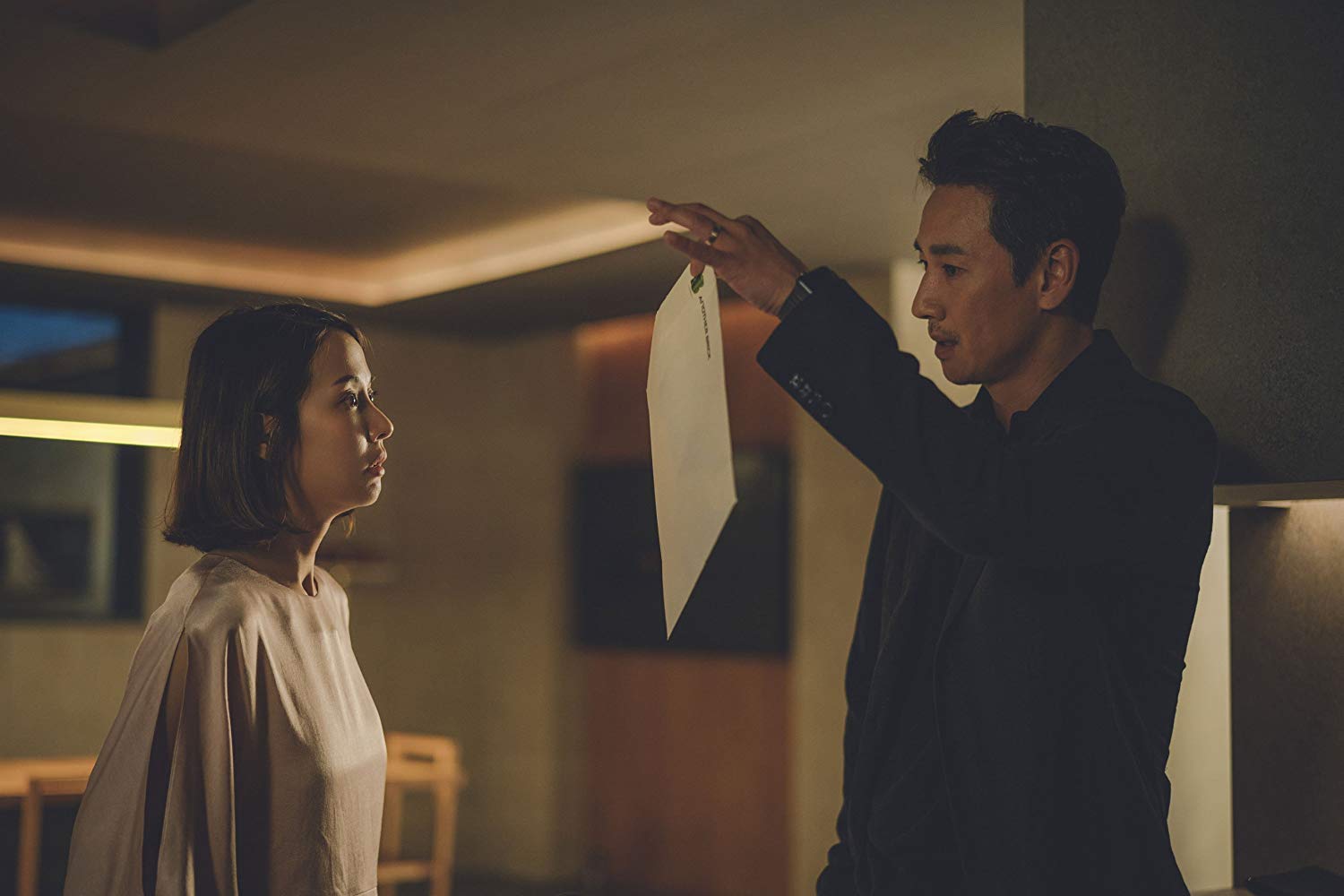The Kim family live in a cramped and messy semi-basement. Picture boxes and bottles lying around, a narrow corridor that leads to the rooms and the bathroom and a tiny table in the common space in which the Kims cook, eat and gulp Soju till they’re shitfaced (which is all the time, by the way). Their phone lines have been cut no thanks to outstanding bills so they raise their phones as close to the ceiling as possible to connect to and leech off their neighbour’s Wi-Fi. They’re also very, very likeable. They’re genuinely a fun-loving bunch that seem to have big aspirations. Kim Ki-Woo (Woo-sik Choi) is a good kid. His sister, Ki-Jung (So-dam Park) is a genius at graphic design but can’t attend art school because money talks and they have none. Dad, Ki-Taek (Kang-ho Song) is a comical guy and mom, Chung-Sook (Hye-jin Jang) is always nagging but you know her heart’s in the right place. One day, Ki-Woo’s friend who’s about to study abroad offers him the opportunity to take over his student. (Ki-Woo’s friend offers him the job, not because of his proficiency in English but because he’s OK at it and doesn’t seem like the kind of guy that would thirst for his highschool student/girlfriend.) But first Ki-Woo needs to convince the super-rich Park family that he’s qualified for the job. He gets his sister to forge some university documents for him. Once he’s hired, the Kim family devise a plan and Parasite metamorphosizes into an exciting, thrilling and drop-dead funny “heist” film. I use the term “heist” loosely as they’re not trying to steal anything, but scam their way into landing jobs for the Parks — as an art-therapist, driver and housekeeper. The scenes become quicker and quicker and transition into an intoxicating montage accompanied by Jaeil Jung’s exhilarating violin score. The scene where Mr Kim rehearses his lines with his son is a short burst of performance dynamite.
At first, the scam seems warrantable. Our leads are funny, talented and charismatic. And who watches a film like Ocean’s Eleven and The Fast and the Furious and roots for the rich guy who’s getting robbed anyway? We root for the people committing the heist because there’s something so delightful about watching a rich person get bent over and screwed. We think, by scamming the Parks, Ki-Jung would finally be able to enrol in art school. We believe Ki-Woo when he says, “it doesn’t matter that I’m forging these documents, as I’ll be enrolling in university sooner rather than later anyway.” This scam would help them escape the depths of hell and onto greener pastures. A middle finger to the man! Except, Bong Joon-Ho and his co-writer Jin Won Han have penned a screenplay that is highly complex and grey. Here, they beg the question: What if the rich people in these movies aren’t assholes? What if they don’t sit on their high horse and mistreat their workers? What if Mr Park isn’t the type of father who isn’t home all the time so he buys expensive gifts for his wife and kids in the name of love? Here, Mr and Mrs Park willingly sleep on the couch so that they can watch their son who wants to sleep in his tent in the front yard. Do the Park children deserve to be antagonised just because they were born into a rich family?
And what if, in order to land the job at the Parks’, our protagonists have to first screw over the current employees who are also of the lower class? What if the Kims are parasitic in nature, the kind who talk about aspirations and dreams but are only familiar with the art of blood-sucking and do so without feeling a hint of guilt or remorse? They’ve convinced themselves that they’re doing it for a “bigger purpose.” When the Parks go out of town, the Kims do what they always do — get shitfaced, only in a bigger house. Then Bong Joon-Ho introduces another wrinkle and Parasite becomes a suspenseful mystery, while still retaining its humour in full force (at one point the Kims scatter like roaches, hiding under tables and beds. It’s both heart-pounding and gut-busting). But the humour here is black as the night’s sky and even the slapsticky stuff comes with a cruel twist. Some of the funniest scenes are also the most heartbreaking. Parasite isn’t about the poor rising up against the rich. It isn’t about rooting for either party, but rooting against capitalism. The Parks may not be bad people, but look at the way Bong Joon-Ho has painted their house? It’s vast and heaven-like. Their large walls shield them from the rest of the world. Even Hong Kyung-pyo’s cinematography is still and calming. In a heart-sinking moment, Mr Park talks to his wife about Ki-Taek’s smell, unaware that he’s around. Apparently, people who use public transportation have a different smell about them than those who don’t. They truly are living in their own bubble.
On top of the hill, in a rich man’s land, the rain feels tranquil. We see it splashing on Park Da-Song’s play tent through a crystal clear window. This is juxtaposed with our protagonists running down many flights of stairs, drenched. As the rain washes downhill, the force becomes more and more powerful until it becomes a destructive weapon. When the Kims reach their semi-basement, it’s filled with overflowing sewage water. They’re frustrated, but not shaken — I’m guessing they’ve experienced it many times before. So much so, at one point, we see Ki-Jung sit on the toilet seat cover, smoking a cigarette as stinky and murky sewage water pours out of it. The brilliance of this Bong Joon-Ho film is that it can be enjoyed on two levels. On the surface, it’s a fun, funny and exciting film about a poor family scamming a rich one. But behind the funny lines, exciting tone and suspenseful beats lie a chilling and dark commentary about the way our society is built. And for Bong Joon-Ho fans who were disappointed in his previous film, Okja, this is the master once again in form. Parasite is pure unadulterated Bong from start to finish — funny, suspenseful, unabashedly weird, bloody, manic and powerful.


